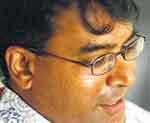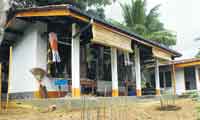|
|
||||||
The call of the village By Ayesha Inoon He has travelled the world – sailed on the Nile, watched the sunrise in Paris and the snowfall in St. Petersburg. He has had a Cambridge education and graduated with a BSc. in Economics from the University of Bristol in England. In Santa Barbara, California he was the Vice President, Finance, of a publishing company for several years. Then what, one might well ask, is he doing running a sprawling ten acre farm set in the heart of the rural village of Godagama in Meegoda?
“My life is so different now from what it used to be, that you cannot even compare it,” says Ranjit Hulugalle, as he strolls through the pebbled path of his farm-land. The lush soil is beginning to show the results of months of cultivation and yields a variety of vegetables, bananas, king coconut and coconut. The cows’ mooing is heard from the cattle-shed in the distance. “Each human being has choices,” he muses, “there are things staring them in the face which they could always make use of.” The eldest grandson of renowned author and Editor H.A.J. Hulugalle, Ranjit was sent to England at the age of thirteen in 1971 by his parents due to the civil unrest in the country at that time. Since then his life had been spent overseas with an occasional visit home. He went on to a career in accounting and management, travelling extensively in the meantime to satisfy his thirst for beautiful and exotic places. The pristine beauty of rural Sri Lanka cast its spell over him when he spent eight months in the country in 2000 training for the post of London Country Manager for Dilmah Tea. As his work took him to several rural areas, and he began to learn the ways of the villagers, he felt irresistibly drawn to these regions. In 2004 he decided it was time to return- not to the dust and noise of the city, but to the serene loveliness of the countryside.
“Farming is in my blood,” he says,
“we are all sons of the soil in a way.” His father,
Upatissa Hulugalle, owned this land, which was mainly a king-coconut
plantation. Ranjit decided he would turn it into a way of life for
himself. At night the shop is illuminated by a number of tiny clay lamps perched on top of a cluster of bamboo poles. A small shed with benches is soon to be turned into a conventional ‘kopi kade’ for the villagers to hobnob. A few metres away is Ranjit’s home-a cosy, whitewashed structure, with numerous photographs of his travels and his family, books and other knick-knacks. Here, on two evenings a week, he teaches English to the village children who cannot afford tuition classes. Following his own methods, he tries to teach the skills of reading and writing and to improve their English vocabulary. Refusing to acknowledge any altruistic motives, Ranjit insists that his classes are merely for his personal fulfilment, and as part of his learning experience on the farm. “I get a lot of satisfaction from interacting with these kids,” he says, “learning how they think, what they want, and how they see the world.”
Having abandoned the mythical ‘greener pastures’ of life overseas to try and make a living out of a farm in the middle of ‘nowhere’, it is hardly surprising that Ranjit has little support for the life he has chosen. However, he has no regrets; he says cheerfully he doesn’t have the time for it, with all the work he has to do to maintain the farm. Everyday he learns something new about life on the land, and to him this is far more exciting than a typical urban existence-“where you go to the same club, meet the same drunks and listen to the same jokes,” he laughs. “I don’t miss the past because I’m constantly seeking new knowledge.” As he pauses to point out a rare bird, examine a fallen tree, or hurries to the shop to serve a customer, Ranjit’s satisfaction and pride in his undertaking are apparent. To take on a rambling, overgrown property and turn it into a profitable lifestyle is surely no easy task. “What I am trying to do is to make a living in a holistic way that is both personally rewarding as well as making a social contribution in educational ways,” he remarks, smiling as he adds, “Every day is different, and that is the beauty of my life.”
|
||||||
Copyright © 2006 Wijeya Newspapers
Ltd. All rights reserved. |


